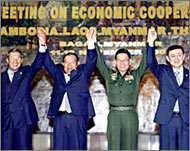Myanmar change setback to reform
The ousting of Myanmar’s prime minister, architect of a tentative road map to democracy, has set back chances for an end to military rule according to the international community.

The United Nations said it was worried by Tuesday’s removal of Khin Nyunt after just over a year in the job and urged the secretive generals in charge of the former Burma to stay committed to democratic reform, despite criticism of the road map.
UN Secretary-General Kofi Annan expressed concern over the welfare of democracy champion Aung San Suu Kyi and her deputy, Tin Oo, who have been under house arrest since May 2003.
The pair must be released “without further delay”, a UN spokeswoman said, even though analysts and diplomats agree that prospect looks ever more unlikely given the outcome of a rumbling power struggle that has left army hardliners in control.
Replaced
Myanmar state television on Wednesday said Khin Nyunt had been “permitted to retire for health reasons” and replaced by Lieutenant General Soe Win.
 |
|
Khin Nyunt was widely seen as an |
Khin Nyunt was widely seen as the driving force behind talks between democracy champion Suu Kyi and the army, even when more entrenched elements of the military were not interested in reconciliation.
But his replacement, a conservative in his mid-50s, is said to be a trusted aid of ruler Senior General Than Shwe.
Suu Kyi’s opposition National League for Democracy won a landslide election victory in 1990, but was denied power by the army which has run the country in various guises since 1962. She has spent much of the past 15 years under house arrest.
Asean embarrassment
Speculation had been rife for months over a widening rift between Than Shwe and Khin Nyunt, who had struggled since his appointment last year to implement a democracy “road map”, which he claimed paved the way for civilian multi-party rule.
The last leadership shake-up occurred in 1992 when Than Shwe, with Khin Nyunt’s backing, ousted Senior General Saw Maung.
Yangon’s intransigence on a genuine democratic transition has embarrassed its South-east Asian neighbours as they prepare to hand the chair of the 10-nation Asean grouping to Myanmar in 2006.
Tuesday’s consolidation of military control has also called into question the Association of Southeast Asian Nations’ (Asean) policy of constructive engagement towards the military, an approach designed to coax democratic reform.